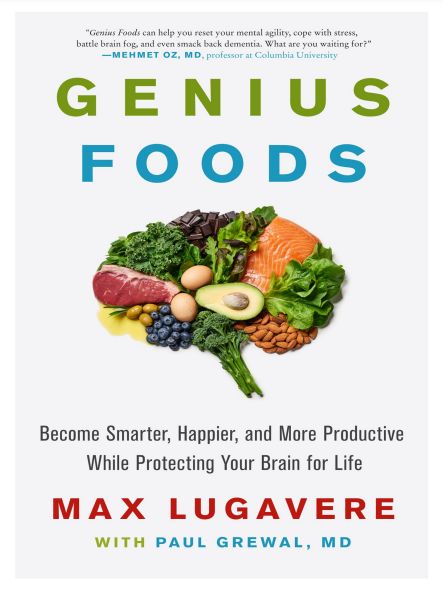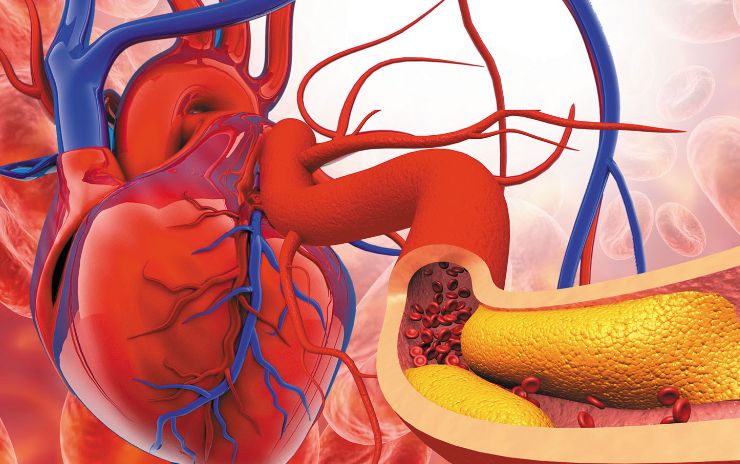
Human brain, is one of the most remarkable developments of evolution. Research has shown that it is capable to develop and adapt throughout our lives. New experiences and environmental changes are instrumental to its ability to reorganize itself by forming new neural connections and pathways. Also called as neural plasticity or brain plasticity.
Yet, there are factors that could be detrimental to our brain health. Poor diet, no physical activity, chronic stress, and insufficient sleep are some triggers that can have negative effects on brain function and cognitive performance.
Author, Max Lugavere, in Genius Foods: Become Smarter, Happier, and More Productive While Protecting Your Brain for Life, talks about the importance of environmental factors and diet in cognitive health. For instance, Deakin University’s Food and Mood Centre revealed in 2017 that improving diet quality can treat major depression. Replacing sugar, fried food, and processed meats with vegetables, olive oil, nuts, fish, whole grains, legumes, and lean red meat can lessen depressive thoughts exponentially.
Lugavere then enumerates some factors, which he thinks compromise our cognitive abilities.
- Inflammation: Our immune system plays a critical role in maintaining our health and protecting us from diseases. However, due to poor diet and sedentary lifestyle we put our immune system under constant stress. And this results in chronic inflammation throughout the body. Inflammation is like forest fire in the brain. Widespread inflammation leads to damaging effect on our DNA. Our bodies become insulin resistant, and thus experience weight gain.
“Even before disease sets in, inflammation can rob us of our cognitive potential. If clear thinking is like coasting down a multilane highway with no traffic and all lanes open, inflammation creates lane closures and bottlenecks in the traffic.” (p54.)
- Overfeeding: We summon food with few swipes on our smartphone. With an easy access to highly processed and calorie-dense foods, many people today consume more calories than they require. And this has led to push our brains to an artificial “bliss point” beyond which self-control becomes futile. Not only it leads to being overweight but we now experience low brain energy, accelerated aging, and decay.
- Nutrient Deficiency: Despite the abundance of food available in many countries, a significant portion of the population fails to consume an adequate amount of key nutrients, including vitamins and minerals. This deficiency has not only accelerated aging but also decline in cognitive function.
- Toxic Exposure: Our modern food supply has become dominated by highly processed and “food-like” products that are often high in calories, sugar, salt, and unhealthy fats, and low in essential nutrients like vitamins, minerals, and fiber. These foods have no nutritional value as they are saturated synthetic additives like syrups, industrial oils, and emulsifiers. Consuming these additives will surely increase the chances of anxiety, depression, suboptimal cognitive performance, along with long-term risk for disease.
- Chronic Stress: Stress is part of our evolution to prepare us for a fight or flight response. However, when this stress response is activated too often or for too long, it can have a toxic effect on our brain function, leading to problems with memory, concentration, and mood. Overeating or consuming more processed and unhealthy foods are some of the repercussions of chronic stress. The compound effect can have a lasting impression on our health and cognitive function.
- Physical Stagnation: From evolutionary point of view, our bodies are designed to move, and a lack of physical activity can have negative effects on our brain health. Regular exercises help us fend off diseases like Alzheimer’s and dementia.
- Sleep Loss: Good quality sleep is vital for optimal brain function and health. A well-rested brain is better equipped with dealing the challenges of life. And prepared to make conscious efforts in dietary and lifestyle changes, which ensures proper functioning of our hormones.
Oils and fats
For optimal brain health, Lugavere recommends extra-virgin olive oil (EVOO). It is laden with a compound – oleocanthal – that has anti-inflammatory effects quite like ingesting small dose of ibuprofen.
People who consume Mediterranean type of diets use healthy fats, such as olive oil, nuts, and fatty fish, instead of saturated and trans fats. The diet is also rich in antioxidants and other nutrients, such as fiber, vitamins, and minerals. Therefore, he says, these diets experience a lower incidence of Alzheimer’s disease, may be because of the presence of oleocanthal compound.
Additionally, he advocates to consume “good fats” such as omega-3s like DHA and EPA. These types of fats not only support brain health but they also come with anti-inflammatory properties.
Fish, pastured eggs, and pasture-raised meats have high omega-3s. Ohio State University study found that consuming more fish oil showed a marked reduction both in inflammation and in anxiety among a cohort of healthy young people. And another study shows it lowers inflammation in overweight older adults.
Omega-3 fat consumption also means ingesting more monounsaturated fats. These healthy fats help with weight loss, reduce the risk of heart disease, and decrease inflammation. Avocados, avocado oil, macadamia nuts, wild salmon, beef, and extra-virgin olive oil are rich in monounsaturated fats.
He strongly recommends not to consume foods that are high in trans-fat. Processed foods, fried foods, and baked goods have this type of unsaturated fat. Trans-fats integrate into the neural membranes in the brain, stiffen them and make them less flexible. The same has also been associated with brain shrinkage and Alzheimer’s disease.

Aging toxins
Today, globally we have enough food with respect to our hunter-gatherer ancestors. However, the food is not nutrient dense, rather fully laden with carbohydrates and refined sugar. In fact, Robert Lustig has identified fifty-six unique terms food manufacturers use to disguise sugar.
Here are just a few of the many names for sugar: cane juice, fructose, malt, dextrose, honey, maple syrup, molasses, sucrose, coconut, sugar, brown rice syrup, fruit juice, lactose, date sugar, glucose solids, agave syrup, barley malt, maltodextrin, and corn syrup.” (p89.)
Consuming excessive amounts of sugar can have negative effects on the body. For instance, it leads to the formation of advanced glycation end-products (AGEs). Inflammation and oxidative stress are associated with AGEs. These can further damage cells and contribute to the development of a variety of health problems, including diabetes, cardiovascular disease, kidney disease, and neurodegenerative disorders. As a matter of fact, adds Lugavere, brain affected by Alzheimer’s disease contains three times the amount of AGEs as in a normal brain.
AGEs also contribute to the aging process by damaging collagen and elastin, which are important proteins that keep the skin and other tissues supple and elastic.
Reducing the intake of foods that are high in AGEs, such as processed and fried foods, can help to reduce the accumulation of AGEs in the body. Therefore, steaming or sautéing are relatively safest cooking style.
When it comes to fruits, Lugavere advocates for consuming low-sugar fruits like coconut, avocado, olives, blueberries, and cacao. As they are all good for brain health. However, high-sugar fruit like figs, dates, mango, banana, and pineapple may lead to metabolic and cognitive imbalance.
Carbs are digested as sugar
Grains are considered a healthy option. But, when it comes to nutrients, they have very small amounts of vitamins and fiber. Due to the presence of starch, they cause blood sugar spike. Accordingly, pancreas begins to release insulin to convert those sugar molecules into energy. And over time, the process might result in resistance to insulin.
When body’s cells become less responsive to the effects of insulin, glucose remains in the bloodstream at higher-than-normal levels. Insulin resistance is strongly associated with several health problems, including type 2 diabetes, cardiovascular disease, obesity, non-alcoholic fatty liver disease and Alzheimer.
When Alzheimer’s patients’ brains were examined (during autopsy), it was observed that the region was occupied with plaques formed by the amyloid protein.
On the surface of the neuron is a protein called amyloid precursor protein (APP). This APP is cut by enzymes freeing a protein called amyloid-beta(Aβ). In healthy brain, these fragments are further broken down and eliminated. In Alzheimer’s patients’ brains these fragments are not washed out but remain accumulated to form sticky, insoluble plaques.
Presence of excessive sugars in the body makes these protein fragments stickier. Therefore, Lugavere recommends consuming foods that are rich in fiber and micronutrients but low in carbs.
“Examples of low-carbohydrate foods include avocado, asparagus, bell peppers, broccoli, Brussels sprouts, cabbage, cauliflower, celery, cucumbers, kale, tomatoes, and zucchini. For your protein and other nutrients, count on foods like wild salmon, eggs, free-range chicken, and grassfed beef.” (p 148.)

Cholesterol is not as bad as people think
It is super important to maintain good health of blood vessels that make up the circulatory system, including arteries, veins, and capillaries. As it is responsible for healthy blood flow and delivering oxygen and nutrients to all the organs and tissues of the body.
Even a slight reduction in blood flow results organ failure and cognitive impairment in case of brain. Alzheimer’s disease and vascular dementia is the result of low performing neural networks.
Idea that consuming foods which are cholesterol rich and saturated fats jeopardise vascular health is a myth. In the words of Dr. Ronald Krauss, a top nutrition expert in the United States,
“there is no significant evidence for concluding that dietary saturated fat is associated with an increased risk of CHD (coronary heart disease) or CVD (cardiovascular disease).” (p155.)
Cholesterol, therefore, is an important nutrient for the brain. For maintaining the structural integrity of brain cells and facilitating communication between neurons – via neurotransmitters and hormones – it accounts for nearly 25% of the body’s total cholesterol.
As per, Dr. Yeon-Kyun Shin, an authority on cholesterol and its function in the brain,
“If you deprive cholesterol from the brain, then you directly affect the machinery that triggers the release of neurotransmitters. Neurotransmitters affect the data-processing and memory functions. In other words—how smart you are and how well you remember things.” (p160.)
Cycling between feasting and fasting
With smartphones in our hands, we are constantly using up all our brain energy. To charge up the brain properly, Lugavere suggests Ketones as one of the most efficient forms of fuel. He insists on putting body into ketosis, by cycling between feasting and fasting.
For starters, he says, the window should be 16:8 method every day, that is, 16 hours fasting and 8 hours of allowed eating. The process is also called as intermittent fasting. By experiencing regular fasting, insulin production would reduce and for fuel, body will then promote the breakdown of stored fats.
Interestingly, according to Lugavere, breakfast isn’t important. Although, I do not resonate on this with him. He says, by skipping the first meal, we can make use of the hormone, cortisol, which helps mobilize fatty acids and glucose. On the contrary, I think balanced breakfast can actually help regulate cortisol levels and also reduce stress levels.
He strongly advocates how important ketogenic diet is especially for the brain. He mentions a study where ketogenic diet was used as treatment for epilepsy. Although not well understood, this diet has successfully reduced seizures in many patients.
Currently, ketogenic diet is being evaluated as an option for treating other neurological diseases like migraines, depression, Alzheimer’s, Parkinson’s, and ALS.
Medium-chain triglycerides (MCTs) are a type of saturated fat that is rapidly absorbed and converted into ketones in the liver. Coconut oil, palm oil, and goat’s milk are rich in MCTs. Lugavere recommends consuming such ketone-generating food. Also, ingesting grass-fed beef is good source of several nutrients that are important for cognitive function. Since, it is rich in iron and zinc and is great source of omega-3 fats, vitamin B12, and Vitamin E all of which have been shown to be important for brain health.

Fiber consumption initiates healthy aging
While describing the importance of fiber and gut health, Lugavere points out the symbiotic behaviour of microbes our skin, around our ears, in our hair, in our mouths, and even in our guts. A fact that has been beautifully presented by Ed Yong, a British-American science journalist, in his famous book, I Contain Multitudes.
Morden diets, says he, have negatively impacted the host-microbe relationship since, the diets have left no room for fiber intake. Foods that are rich in prebiotic fiber includes, berries, leeks, jicama, kale, sunchokes, avocado, spinach, arugula, garlic, onions, coffee, chicory root, unripe bananas, raw nuts, fennel, okra, bell peppers, broccoli, radishes, dark chocolate, and sprouts.
Gut microbiota produces short-chain fatty acids, or SCFAs by metabolizing prebiotic fibers. There are three primary types of SCFA – Acetate, Propionate and Butyrate. All of these are important for regulating the immune system, maintaining the integrity of the intestinal barrier and in implicating various metabolic processes throughout the body, such as glucose and lipid metabolism.
Out of the three, Butyrate has also been shown to reduce inflammation and improve neuroplasticity and neurodegenerative processes. Fiber consumption, over all, initiates healthy aging.
“In fact, the gut is actually your largest interface with the environment— much larger than your skin.” (p 240.)
Diet and mental health go hand in hand
Anti-anxiety medications, antidepressants, and ADHD drugs aim to alter the “levels of neurotransmitters” so that we “feel good”. That is one of the main reasons why we consume coffee, alcohol, cocaine, and MDMA.
Research indicates that underlying brain problems are not due to the reduced level of neurotransmitters available in the brain, but rather by neurotransmitters that are unable to work the way they ought to. Primarily, this happens because of an induced or underlying dysfunction.
“Similarly, dementia is not caused by low acetylcholine, a neurotransmitter involved in memory; acetylcholine is low because the neurons that produce it are, in many cases, slowly dying.” (p273.)
So, the medications that we ingest for neurological disorders solve the underlying problem that is causing the disease or disorder. Well, the answer is no, as per Lugavere. These kinds of medicines are simply acting as Band-Aids.
Acetylcholine, a neurotransmitter, that is responsible for REM sleep, learning, and memory, is also associated with Alzheimer’s disease.
Pathologically, alzheimer’s disease is caused by plaques (abnormal clusters of protein fragments) and tangles (twisted strands of another protein). However, recent research has revealed that acetylcholine-producing neurons seem to be impaired during alzheimer’s disease.
Lugavere claims that “anticholinergic” drugs to be avoided for ensuring optimal acetylcholine function. Regular consumption of anticholinergic medications leads to lower brain glucose metabolism and poorer cognitive abilities. These drugs are easily available over the counter as they are used to “treat” everything from allergies to insomnia.
Choline is converted into acetylcholine, therefore, diet can surely help in filling the gap. Beef liver, shrimp, scallops, beef, chicken, fish, Brussels sprouts, broccoli, spinach and most importantly, eggs are the top choline rich foods.
Along with acetylcholine, one should take care of serotonin as well. The happy hormone is responsible for how we feel. Vitamin D and omega-3s supplements are the best way to increase the optimum level.
Diet and mental health go hand in hand. Eating well can surely help us feel better.

Takeaway
The Genius Plan is one of the most interesting books that gives us a close picture of what are we supposed to eat to reach our optimal health. My personal takeaways are:
- Taking good care of entire vascular system. Optimal brain function is directly related to healthy vascular system.
- Consuming nutrient-dense foods for optimal brain performance and devoid of the foods that cause hormonal dysregulation, oxidative stress, and inflammation.
- Glucose metabolism is super important as it is energetic currency for cell.
- Inflammation within body is like forest fire. It is no good, rather super harmful. So, we need to totally avoid acidic foods and drinks that cause inflammation.
- There is an important link between diet and cognitive health. Chronically elevated blood sugar (and insulin) compromises our cognitive health.
Refined and processed carbohydrates should totally be avoided. Even during the cheat days. Chips, crackers, salad dressings, soft drinks, frozen packaged foods, concentrated sweeteners, are all “slow poison”.
Keep your body moving with foods that have omega-3 rich oils, low-sugar fruits, dark chocolate (for flavonoids). And for carbs (50-70 gms/day) – ripe bananas, sweet potatoes, or white and brown rice.
Brain fogginess, depression, anxiety, and risk for diseases like Alzheimer’s, Parkinson’s, and ALS all can be curable via simple diet and exercise. Do not wait for the symptoms to surface, start right away.
I think I’ll try to implement the Genius Plan in my diet, however, being a vegetarian, I would replace the fish, the eggs and the meat with more greens and fruits. Whether you are into fitness or not, this book should be on everyone’s reading list.



